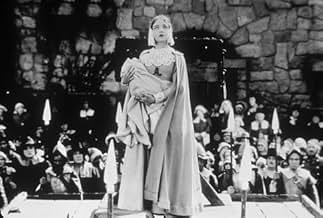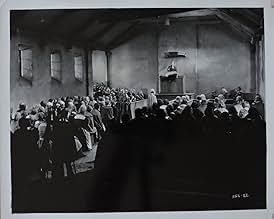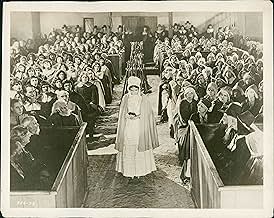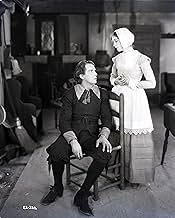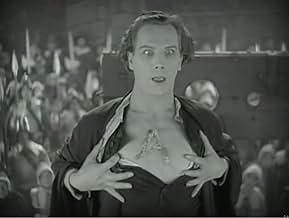CALIFICACIÓN DE IMDb
7.6/10
2.1 k
TU CALIFICACIÓN
Tras tener un hijo fuera del matrimonio, una joven puritana es presionada para que revele el nombre de su amante.Tras tener un hijo fuera del matrimonio, una joven puritana es presionada para que revele el nombre de su amante.Tras tener un hijo fuera del matrimonio, una joven puritana es presionada para que revele el nombre de su amante.
- Dirección
- Guionistas
- Elenco
- Premios
- 1 premio ganado en total
Buck Black
- Child in crowd
- (sin créditos)
Nora Cecil
- Townswoman
- (sin créditos)
Iron Eyes Cody
- Young Indian at Dunking
- (sin créditos)
Artye Folz
- Child
- (sin créditos)
Dorothy Gray
- Child
- (sin créditos)
Douglas Haig
- Minor Role
- (sin créditos)
Betsy Ann Hisle
- Child
- (sin créditos)
Opiniones destacadas
A young mother is forced to wear THE SCARLET LETTER of adultery by her repressive society.
Nathaniel Hawthorne's classic novel is brought brilliantly to life in this excellent Silent film from MGM. Because the book was on the censored list, Lillian Gish, the era's finest actress, had to campaign vigorously with both the studio hierarchy and civic morality groups around the country to be allowed to make the film, causing her to ironically deal with the same sort of moral strictures her heroine would face in the film.
Her persistence paid off. She was able to obtain the services of director Victor Sjöström and actor Lars Hanson, both from Sweden. Sjöström instructed Miss Gish in the Scandinavian method of natural acting and he gave the film a blunt, no-nonsense look, crisp & clean, utilizing the Studio's excellent sets to the best of their advantage. Frances Marion, the most celebrated screenwriter of the day, was responsible for the literate script.
As the much harried Hester Prynne, Gish is beatific, her face radiating as if from an inner glow. She is playfully sweet as the community seamstress, wanting to cavort on the Sabbath or wear frilly clothing, only two of the actions proscribed & punishable by the Puritans' implacable rigidity. Later, with Hanson, she takes the viewer along as she delights in her new, hidden joy as he returns her love. Whether calmly standing on the scaffold to endure her shame, or fiercely protecting the unbaptized offspring of her forbidden passion, Gish never for an instant loses her grip on the pathetic character she's portraying.
Although he spoke no English, this was not a hindrance to Hanson. Playing the conflicted Rev. Arthur Dimmesdale, Boston's saintly parson, he paints the portrait of a good man literally dying of guilt, a weak man who dare not defend his wife & child. Hanson's face reflects his agony, his left hand twitching at his own breast where his secret symbol of shame is hidden. With Gish unobtainable in this world, he moves steadily towards the inevitable, and deeply poignant, conclusion.
Henry B. Walthall, Miss Lillian's costar in Griffith's THE BIRTH OF A NATION (1915), has the supporting role of a mysterious stranger whose arrival in Boston foreshadows a dire denouement for the wretched lovers.
Also in the cast are Karl Dane who acts out the viewers' dismay at the solemnity of the Puritans, most especially in the person of vindictive gossip Marcelle Corday; there is no love lost between this pair. Movie mavens will recognize diminutive Polly Moran & dour Nora Cecil as rigid Puritan matrons, both uncredited.
Nathaniel Hawthorne's classic novel is brought brilliantly to life in this excellent Silent film from MGM. Because the book was on the censored list, Lillian Gish, the era's finest actress, had to campaign vigorously with both the studio hierarchy and civic morality groups around the country to be allowed to make the film, causing her to ironically deal with the same sort of moral strictures her heroine would face in the film.
Her persistence paid off. She was able to obtain the services of director Victor Sjöström and actor Lars Hanson, both from Sweden. Sjöström instructed Miss Gish in the Scandinavian method of natural acting and he gave the film a blunt, no-nonsense look, crisp & clean, utilizing the Studio's excellent sets to the best of their advantage. Frances Marion, the most celebrated screenwriter of the day, was responsible for the literate script.
As the much harried Hester Prynne, Gish is beatific, her face radiating as if from an inner glow. She is playfully sweet as the community seamstress, wanting to cavort on the Sabbath or wear frilly clothing, only two of the actions proscribed & punishable by the Puritans' implacable rigidity. Later, with Hanson, she takes the viewer along as she delights in her new, hidden joy as he returns her love. Whether calmly standing on the scaffold to endure her shame, or fiercely protecting the unbaptized offspring of her forbidden passion, Gish never for an instant loses her grip on the pathetic character she's portraying.
Although he spoke no English, this was not a hindrance to Hanson. Playing the conflicted Rev. Arthur Dimmesdale, Boston's saintly parson, he paints the portrait of a good man literally dying of guilt, a weak man who dare not defend his wife & child. Hanson's face reflects his agony, his left hand twitching at his own breast where his secret symbol of shame is hidden. With Gish unobtainable in this world, he moves steadily towards the inevitable, and deeply poignant, conclusion.
Henry B. Walthall, Miss Lillian's costar in Griffith's THE BIRTH OF A NATION (1915), has the supporting role of a mysterious stranger whose arrival in Boston foreshadows a dire denouement for the wretched lovers.
Also in the cast are Karl Dane who acts out the viewers' dismay at the solemnity of the Puritans, most especially in the person of vindictive gossip Marcelle Corday; there is no love lost between this pair. Movie mavens will recognize diminutive Polly Moran & dour Nora Cecil as rigid Puritan matrons, both uncredited.
I'm familiar with concept of the story, but didn't know any of the details of the film, so I was left gripped by it, waiting to see how it would all unfold. Lillian Gish is the lead, and Lars Hanson is the pastor who she has an affair with. Both give great performances on par with their work in The Wind, and the film does a wonderful job at dealing with the complexity of the religious themes. The scene where a bunch of town kids pelt Gish's young daughter with mud simply for being the child of an unwed mother is one of the more harrowing sequences I've seen. It's just brutally grim. Without having read the original source material, I have no idea how accurate the film is, but regardless it was really compelling and complex exploration of religion and hypocrisy.
10Doug-193
Exactly what we've lost since the end of the silent era is magnificently on display in Victor Seastrom's THE SCARLET LETTER: shimmering black and white photography of superbly composed and paced scenes capturing the essence of the American classic novel by Hawthorne, though certain details of the story have been altered and may annoy literary purists. This is not the novel but a separate work, more than a perceptive and intelligent picturization. Here is the great, lost art of silent screen acting, with Lillian Gish, unforgettable as Hesther Prynne, leading an accomplished cast. The result is pure visual poetry.
It was a novel Hollywood didn't want to touch in the mid-1920s, even though the 1850 classic was brought to the screen six times earlier. The recently-established Will Hays office had its censorship fangs out. A story about a married woman who gets pregnant by a lover was cause for alarm for most movie studios.
Lilian Gish, one of silent film's major star, had long wanted to bring Nathaniel Hawthorne's 'The Scarlet Letter' in an updated version to the screen. Contracted to MGM in a three-picture deal, she convinced the studio's head of production, Irving Thalberg, she could deliver a tasteful version of Hawthorne's book without moralistic tongue-waggers complaining. With a script by Frances Marion, which follows the novel closely, MGM's August 1926's "The Scarlet Letter" has been praised as the best version of the book in a long-line of past and future movie adaptations.
Its success can be attributed to Gish herself, who portrays Hester Prynne. She hasn't heard from her husband who traveled overseas for several years from their Puritan Boston, Massachusetts, home in the mid-1600s. She becomes pregnant from a man whom she doesn't disclose the name. The Gish version departs from Hawthorne in a couple of major ways: the film begins a year earlier than the author's, showing her condemned to a stockade for leaping and dancing after her song bird escapes its cage. It's there where she meets the Reverend Arthur Dimmesdale (Lars Hanson). Also, the films unveils the love relationship between the minister and Hester, not keeping secret of who's the father of the baby.
Another reason for the movie's overall financial popularity is Swedish director Victor Sjostrom's unique directing. He allowed Gish the freedom to display her attractiveness by literally letting her hair down in a clandestine meeting with Dimmesdale in the woods, reflecting Hester's modernistic independence. Gish had the choice in selecting the director, and she picked Sjostrom because she "felt the Swedes were closer to the feelings of New England Puritans than modern Americans." She also favored Hanson as Dimmesdale from his 1924 performance in "The Saga of Gosta Berling." Hanson, who knew very little English, elected to speak his lines (it was a silent movie after all) in Swedish while Gish spoke English in scenes where they're together. Homesick actress Greta Garbo, recently arriving in America from Sweden after signing a contract with MGM, was a near daily presence on the set since she was comfortable speaking her native language with Hanson.
With two weeks of filming to go, Lillian found out her mother suffered a stroke in London and reportedly dying. Dorothy, her sister, urged her to catch the first boat to England to attend to her. In a near impossible request, Lillian asked Sjostrom she needed to leave in three days to travel by train to New York City, then on to a liner to London. The director didn't flitch. He designed an almost around-the-clock schedule to film all of Gish's parts-as long as the crew agreed to the grueling sleepless itinerary. The workers heartedly agreed.
"The Scarlet Letter" is still admired for Sjostrom's creation of an environmental rise en scene that underscored the film's characters' emotion and psychology by its pastoral recreation of a 17th century village. Even though the residents of Salem, MA, where the story takes place, were insulted by their forefathers' portrayal in the film, the American Film Institute nominated it as one of the most passionate motion pictures ever made as well as nominated Hester Prynne as one of movie's most admired heroes.
Lilian Gish, one of silent film's major star, had long wanted to bring Nathaniel Hawthorne's 'The Scarlet Letter' in an updated version to the screen. Contracted to MGM in a three-picture deal, she convinced the studio's head of production, Irving Thalberg, she could deliver a tasteful version of Hawthorne's book without moralistic tongue-waggers complaining. With a script by Frances Marion, which follows the novel closely, MGM's August 1926's "The Scarlet Letter" has been praised as the best version of the book in a long-line of past and future movie adaptations.
Its success can be attributed to Gish herself, who portrays Hester Prynne. She hasn't heard from her husband who traveled overseas for several years from their Puritan Boston, Massachusetts, home in the mid-1600s. She becomes pregnant from a man whom she doesn't disclose the name. The Gish version departs from Hawthorne in a couple of major ways: the film begins a year earlier than the author's, showing her condemned to a stockade for leaping and dancing after her song bird escapes its cage. It's there where she meets the Reverend Arthur Dimmesdale (Lars Hanson). Also, the films unveils the love relationship between the minister and Hester, not keeping secret of who's the father of the baby.
Another reason for the movie's overall financial popularity is Swedish director Victor Sjostrom's unique directing. He allowed Gish the freedom to display her attractiveness by literally letting her hair down in a clandestine meeting with Dimmesdale in the woods, reflecting Hester's modernistic independence. Gish had the choice in selecting the director, and she picked Sjostrom because she "felt the Swedes were closer to the feelings of New England Puritans than modern Americans." She also favored Hanson as Dimmesdale from his 1924 performance in "The Saga of Gosta Berling." Hanson, who knew very little English, elected to speak his lines (it was a silent movie after all) in Swedish while Gish spoke English in scenes where they're together. Homesick actress Greta Garbo, recently arriving in America from Sweden after signing a contract with MGM, was a near daily presence on the set since she was comfortable speaking her native language with Hanson.
With two weeks of filming to go, Lillian found out her mother suffered a stroke in London and reportedly dying. Dorothy, her sister, urged her to catch the first boat to England to attend to her. In a near impossible request, Lillian asked Sjostrom she needed to leave in three days to travel by train to New York City, then on to a liner to London. The director didn't flitch. He designed an almost around-the-clock schedule to film all of Gish's parts-as long as the crew agreed to the grueling sleepless itinerary. The workers heartedly agreed.
"The Scarlet Letter" is still admired for Sjostrom's creation of an environmental rise en scene that underscored the film's characters' emotion and psychology by its pastoral recreation of a 17th century village. Even though the residents of Salem, MA, where the story takes place, were insulted by their forefathers' portrayal in the film, the American Film Institute nominated it as one of the most passionate motion pictures ever made as well as nominated Hester Prynne as one of movie's most admired heroes.
Victor Sjöström's The Scarlet Letter is a masterpiece. It should be put on DVD for all to enjoy, even if parts of the film have to be supplemented with 16mm dupes. TCM hasn't shown it in years, yet they show The Wind several times every year. It makes no sense. The Scarlet Letter is even better than The Wind. It should be shown in high school classes along with the required reading of the classic novel by Nathanial Hawthorne. It makes my head spin to think of how many thousands of children would fall in love with silent film if they were only exposed to this classic. I hate to think of them being exposed to that horrific Demi Moore version instead.
Lillian Gish is radiantly beautiful as the demure but sensual Hester Prynne. Lars Hanson makes an exceptionally wonderful minister Dimmesdale, fighting his romantic feelings for the lovely Hester. Henry B. Walthall makes a very believable and threatening Roger Prynne. Karl Dane adds some wonderful comic relief as Master Giles. The M-G-M production values here are exceptional and the cinematography by Henrik Sartov glows. I love the tracking shots of Hester and the Reverend Arthur Dimmesdale walking together in the woods, and the lovely shot of their reflections in the lake as they confess their love for one another. Poetry on screen. The musical score for the film is quite beautiful, commissioned by TCM in 2000. The only parts that got on my nerves were the harpsichord sections. The flute, piano and violin parts were the best.
Your silent film viewing is not complete without seeing this classic. It's Lillian Gish's best film. Don't miss it.
Lillian Gish is radiantly beautiful as the demure but sensual Hester Prynne. Lars Hanson makes an exceptionally wonderful minister Dimmesdale, fighting his romantic feelings for the lovely Hester. Henry B. Walthall makes a very believable and threatening Roger Prynne. Karl Dane adds some wonderful comic relief as Master Giles. The M-G-M production values here are exceptional and the cinematography by Henrik Sartov glows. I love the tracking shots of Hester and the Reverend Arthur Dimmesdale walking together in the woods, and the lovely shot of their reflections in the lake as they confess their love for one another. Poetry on screen. The musical score for the film is quite beautiful, commissioned by TCM in 2000. The only parts that got on my nerves were the harpsichord sections. The flute, piano and violin parts were the best.
Your silent film viewing is not complete without seeing this classic. It's Lillian Gish's best film. Don't miss it.
¿Sabías que…?
- TriviaLillian Gish learned that her mother had had a stroke in London and her sister, Dorothy Gish, urged her to get there on the first available boat. When Lillian informed director Victor Sjöström of the need to finish the film quickly, he created a shooting schedule that crammed two weeks worth of shooting into three days of non-stop work. The crew worked without complaint so that she could finish the film early and catch the earliest possible train to New York.
- Citas
Mistress Hibbins: I am wrongly accused! Never hath my tongue been given to gossip!
The Governor: Falsehood! Her tongue hath wagged like the tail of a dog! Duck her again!
- Versiones alternativasIn 2000, Turner Entertainment Co. copyrighted a restored version with a musical score written by Lisa Catarineau and Mark Northam and a running time of 98 minutes. Its previous version ran 79 minutes.
- ConexionesFeatured in The 43rd Annual Academy Awards (1971)
Selecciones populares
Inicia sesión para calificar y agrega a la lista de videos para obtener recomendaciones personalizadas
- How long is The Scarlet Letter?Con tecnología de Alexa
Detalles
- Fecha de lanzamiento
- País de origen
- Sitio oficial
- Idioma
- También se conoce como
- Nathaniel Hawthorne's the Scarlet Letter
- Locaciones de filmación
- Productora
- Ver más créditos de la compañía en IMDbPro
Taquilla
- Presupuesto
- USD 430,290 (estimado)
- Tiempo de ejecución1 hora 55 minutos
- Mezcla de sonido
- Relación de aspecto
- 1.33 : 1
Contribuir a esta página
Sugiere una edición o agrega el contenido que falta

Principales brechas de datos
By what name was The Scarlet Letter (1926) officially released in India in English?
Responda
